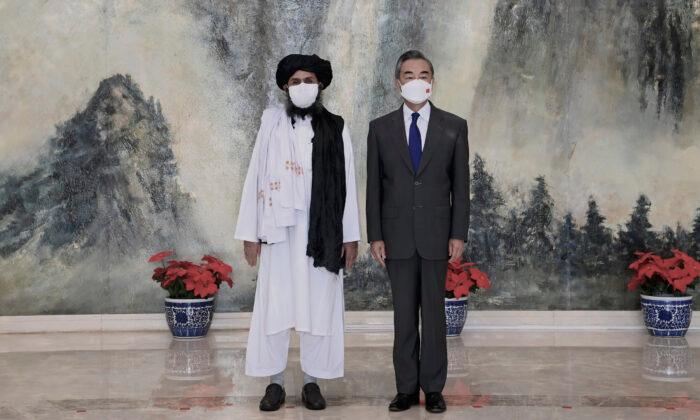Chinese foreign minister met Wednesday with a delegation of high-level Taliban representatives as ties between them warm ahead of the U.S. pullout from Afghanistan.
A photo posted on the ministry’s website showed Wang Yi posing with senior Taliban leader Mullah Abdul Ghani Baradar and his delegation in the city of Tianjin, then sitting down to talks. The highly conspicuous show of friendliness had the appearance of a diplomatic mission at a time when the Taliban terrorists are craving legitimacy.
While no agenda was announced for the meeting, the Chinese communist regime has an interest in pushing the Taliban to deliver on peace talks or at least reduce the level of violence as they gobble up territory from Afghan government forces.
China and Afghanistan share a narrow border high in the remote Wakhan Valley, and the Chinese regime has long been concerned about a possible spillover of Islamic militancy into its formerly volatile Xinjiang region. China has also signed deals for oil, gas, and copper mining in Afghanistan, although those have long been dormant.
“The Taliban are a pivotal military and political force in Afghanistan and are expected to play an important role in the process of peace, reconciliation, and reconstruction,” Wang said.
The heads of the Taliban Religious Council and the Propaganda Committee were also on the trip.
The U.S. withdrawal from Afghanistan by Aug. 31 is seen as a boon to the Chinese regime, Washington’s chief strategic competitor, which has long resented the presence of U.S. troops in what it considers its own backyard.
If the Taliban do topple the U.S.-backed central government, the Chinese regime could gain a strategic corridor allowing it and long-time ally Pakistan to bring further pressure against common rival India.
Baradar’s visit comes shortly after Pakistan’s foreign minister and intelligence chief made their trips to China.
Pakistan is seen as key to peace in Afghanistan. The Taliban leadership is headquartered in Pakistan and Islamabad has used its leverage, which it says is now waning, to press the Taliban to talk peace.
While the Tianjin meeting could be seen as a snub at the United States, Washington has been meeting with China and Russia to produce statements calling on the Taliban to enter into a peace deal.
Zalmay Khalilzad, Washington’s point person in talks aimed at ending decades of war in Afghanistan, also made a brief visit to Pakistan earlier this month as relations between Islamabad and Kabul reached a new low.
That has fed perceptions that the United States is engaged in stepped-up efforts to obtain a peace deal ahead of the Aug. 31 deadline that also includes China.
After U.S. Deputy Secretary of State Wendy Sherman met Wang in Tianjin on Monday, she and the State Department included Afghanistan on the list of “areas of global interest” that the United States and China could cooperate on.






Friends Read Free